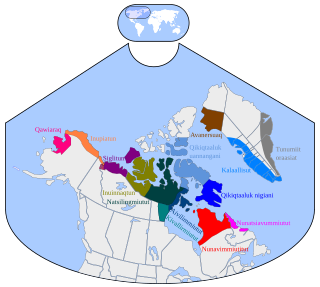Tunumiisut
| Tunumiisut | |
|---|---|
| tunumiisut | |
| Native to | East Greenland |
| Ethnicity | Tunumiit |
Native speakers | (3,000–3,500 cited 1995)[1] |
Eskaleut
| |
Early forms | |
| Language codes | |
| ISO 639-3 | – |
| Glottolog | tunu1234 |
| IETF | kl-tunumiit |
 Map of the Inuit languages; Tunumiisut is grey. | |
 East Greenlandic is classified as Definitely Endangered by the UNESCO Atlas of the World's Languages in Danger | |
Tunumiisut (lit. 'language of the Tunumiit'), also known as East Greenlandic (Danish: østgrønlandsk), is the language of the Tunumiit in East Greenland. It is generally categorised as a dialect of Greenlandic, but verges on being a distinct language.[2][3] The largest town where it is the primary language is Tasiilaq on Ammassalik Island, with the island's name being derived from the West Greenlandic name of the town.
Phonology
Vowels
| Front | Back | |
|---|---|---|
| Close | i iː | u uː |
| Open | a aː | |
Consonants
| Labial | Alveolar | Palatal | Velar | Uvular | ||
|---|---|---|---|---|---|---|
| plain | lateral | |||||
| Nasal | m | n | ŋ | ɴ | ||
| Plosive/ Affricate |
p | t | (t͡ɕ) | k | q | |
| Fricative | v | s | ɣ | ʁ | ||
| Approximant | l | j | ||||
The following sounds may also occur as geminated; /pː, tː, kː, qː, sː, mː, nː, ŋː/.
- /v/ may be heard as either [v], [β], [w] or [ɥ].
- /l/ may also be heard as [d] in initial positions.
- Sounds /s, sː/ may also be heard as palatalized sounds [ɕ, t͡ɕ] when in palatal positions.
- Sounds /k/ and /q/ may also have intervocalic allophones as [x, ɣ] and [χ, ʁ].
- Nasals /ŋ, ɴ/ can be heard as nasalized fricatives [ɣ̃, ʁ̃] in various environments.[3]
References
- ^ 3,000 in Greenland, and perhaps 20% more in Denmark. Greenlandic at Ethnologue (16th ed., 2009)

- ^ Nicole Tersis, in Variations on polysynthesis: the Eskaleut languages Ch. 4
- ^ a b Mennecier, Philippe (1995). Le tunumiisut, dialecte inuit du Groenland oriental: description et analyse. Collection linguistique, 78 (in French). Société de linguistique de Paris, Peeters Publishers.

